Record of a Tenement Gentleman Blu-ray Movie
HomeRecord of a Tenement Gentleman Blu-ray Movie 
長屋紳士録 / Nagaya shinshirokuBFI Video | 1947 | 72 min | Rated BBFC: PG | No Release Date
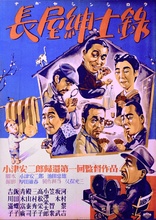
Price
Movie rating
6.9 | / 10 |
Blu-ray rating
| Users | 0.0 | |
| Reviewer | 4.0 | |
| Overall | 4.0 |
Overview
Record of a Tenement Gentleman (1947)
In an impoverished Tokyo neighborhood that has been partly destroyed in bombing raids, a hard-hearted middle-aged widow reluctantly takes in a child abandoned by his father. Bitter at first, she soon finds herself growing fond of the boy.
Starring: Chishû Ryû, Hohi Aoki, Eitarô Ozawa, Mitsuko Yoshikawa, Reikichi KawamuraDirector: Yasujirô Ozu
| Foreign | Uncertain |
| Drama | Uncertain |
Specifications
Video
Video codec: MPEG-4 AVC
Video resolution: 1080p
Aspect ratio: 1.37:1
Original aspect ratio: 1.37:1
Audio
Japanese: DTS-HD Master Audio 2.0 Mono
Japanese: DTS-HD Master Audio 2.0 (48kHz, 24-bit)
Subtitles
English
Discs
Blu-ray Disc
Single disc (1 BD)
Packaging
Slipcover in original pressing
Playback
Region B (A, C untested)
Review
Rating summary
| Movie | 4.0 | |
| Video | 4.5 | |
| Audio | 5.0 | |
| Extras | 1.5 | |
| Overall | 4.0 |
Record of a Tenement Gentleman Blu-ray Movie Review
Reviewed by Dr. Stephen Larson December 16, 2023Record of a Tenement Gentleman (1947) is being released as part of the BFI's two-disc set, Three Films by Yasujirō Ozu.
Many years ago when I tried to obtain a copy of Ozu's fortieth feature Record of a Tenement Gentleman, I read a quote on New Yorker Video's VHS cover that read: "If Ozu had made only this seventy-two minute film, he would have to be considered one of the world’s great directors." Years later, I forgot who made that declaration and much to my great surprise, it was David Bordwell, who I've sometimes cited in my reviews of this collection. Known for applying critical lenses such as Russian formalism and narrative theory to analyze films, Bordwell seldom resorted to editorializing or giving his subjective views of movies in his books so the quote raised my eyebrows.
Record of a Tenement Gentleman more correctly translates from the original Japanese title Nagaya shinshiroku to A Who's Who of the Tenements. As Tony Rayns notes in the booklet, the term "tenements" has a different conception for a westerner than it does for a Japanese citizen. For the latter, Rayns describes it to signify "low-rise wooden houses in the area of Tokyo around Ueno." This is the setting for Ozu's 1947 film, one of the director's "smaller" dramas. It concerns a boy kindergarten-age whose father left him in Chigasaki south of Tokyo on the coast. The dad of Kohei (Hôhi Aoki) left for Tokyo to look for a new job. Tashiro (Chishû Ryû), a fortune-teller, discovers Kohei and brings him to the house of Tamekichi (Reikichi Kawamura), a struggling actor and repairman. Tashiro asks Tamekichi if he'd like to take him in but the latter declines, saying he doesn't really like kids. Tashiro takes Kohei to his neighbor Otane (Chôko Iida), a widow who operates a kitchenware shop. Otane is also resistant but Tashiro leaves the boy with her anyway. "Shoo! Shoo!" Otane snaps at Kohei. The audience instantly identifies with the sadness and neglect on Kohei's face. Otane nonetheless lets Kohei stay the night with her, but the boy wets the futon out of nervousness. The scene where Otane instructs Kohei to fan his damp blanket on the clothesline is one of several humorous scenes Ozu injects into the picture. Otane brings Kohei on a stroll to Chigasaki to see if they can locate his father but he isn't around. Otane tries to separate from Kohei but ends up using him to haul back some sweet potatoes. Record is about Otane's growing acceptance and affection for Kohei.
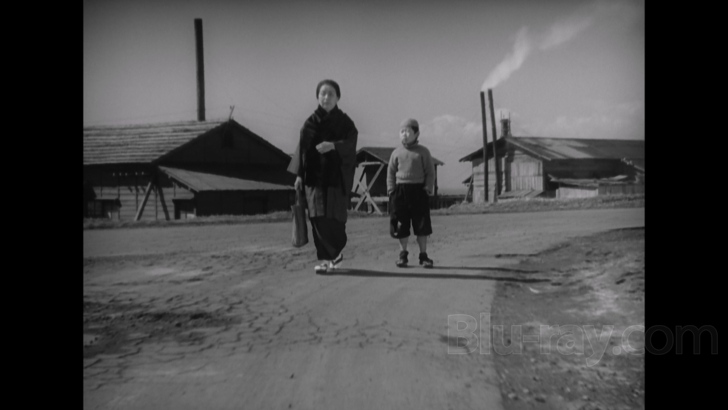
Record is sumptuously lensed by cinematographer Yuharu Atsuta. The elongated sequence where Otane and Kohei trek to the beach and around the dunes is beautiful in its sparseness. One potential subplot that Ozu and his co-writer Tadao Ikeda could have developed is an intermingling between Kohei and the young son (Yūichi Kaga) of Kawayoshi, who is president of the residents’ committee that Otane belongs. Kawayoshi's son is seen tapping his chopstick against a cup while the adults chant some kind of folk song. Kohei is almost always seen with Otane and it's surprising that he doesn't have anyone to play with, including some of the local kids who fish together. It seems like this omission is Ozu's way of stripping his story and mise-en-scène down to the bare essentials.
Record of a Tenement Gentleman Blu-ray Movie, Video Quality 
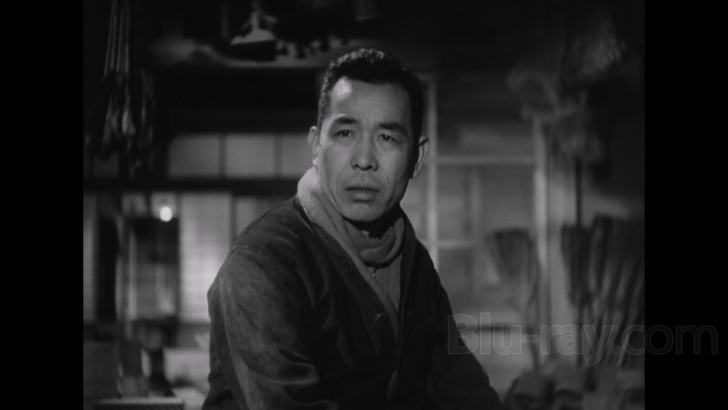
The BFI's Blu-ray of Record of a Tenement Gentleman represents a significant achievement for where the film was restoration-wise earlier in the millennium compared to what has recently been done to it. The movie has been available on Blu-ray before in an eleven-disc set French label Carlotta Films released in 2019, but the transfer was apparently struck from a SD source. I first owned Record in the mid-2000s when Tartan UK released it in the label's Ozu: Volume Two set, which also came with Flavour of Green Tea Over Rice (1952). Tartan recorded a most interesting note about the film's restoration in a leaflet. It's worth quoting in full:
Record of a Tenement Gentleman was originally shot and edited on film and mastered to analogue videotape. However, analogue master tapes have a relatively short lifespan, and the image quality significantly deteriorates with the passage of time. Also, due to technical inadequacies inherent in this particular transfer, the presence of regular jumping frames and a constant "weaving" have rendered this master almost unusable.
With access limited to the aforementioned analogue master, Tartan Video decided to undertake a full digital restoration of this classic in an attempt to bring it up to a standard acceptable to today's audiences, whilst still preserving as much of the historical detail as possible.
Using the very latest digital restoration technology, available at The Machine Room in London, Tartan Video processed the film via the Archangel digital restoration system, which allows picture movement to be stabilised, picture noise to be reduced and a certain level of film dirt and scratches inherited from the original film to tape transfer to be removed. The settings on this process have to be very exact in order to achieve the required effect without adversely affecting the quality of the existing picture.
Now compare that with the BFI's restoration notes in its booklet:
Record of a Tenement Gentleman was digitally restored in 2023. The 4K restoration was managed by Shochiku and conducted by IMAGICA Entertainment Services, Inc. with the support of J-LOD. Colour correction supervised by Masashi Chikamori and sound restoration supervised by Kazunori Shimizu.
I have italicized a phrase for emphasis in Tartan's notes because the image occasionally wobbles and jiggles. The Shochiku Home Video logo appears at the start of Tartan's transfer. The label did not properly convert it to PAL from an NTSC source, which resulted in ghosting and combing problems. I have enlarged and zoomed in on the frame enlargements I took from the Tartan so you can see how washed the image looks compared to the BFI, which has vastly superior contrast. Notice how much more solid the black levels are on the BFI. Shochiku and IMAGICA's restoration is almost as good as their work on A Hen in the Wind. A tramline along the right side (see Screenshot #15) is present for longer durations in this picture than it is on the 1948 film. The BFI has encoded the MPEG-4 AVC-encoded BD-50 at a mean video bitrate of 34938 kbps. My video score is 4.75/5.00.
The BFI has provided ten chapters.
Screenshot #s 1-17, 19, 21, 23, 25, & 27 = BFI
Screenshot #s 18, 20, 22, 24, & 26 = Tartan
Record of a Tenement Gentleman Blu-ray Movie, Audio Quality 
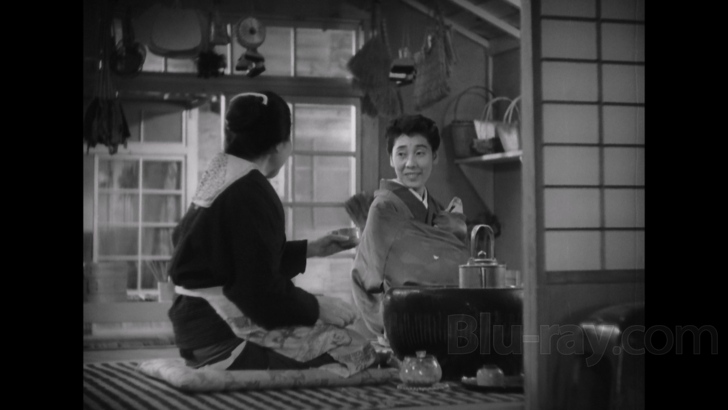
The BFI has supplied two uncompressed tracks: a DTS-HD Master Audio Dual Mono (897 kbps, 16-bit) and a DTS-HD Master Audio Dual Mono (1570 kbps, 24-bit). One is a restored audio mix and the other an unrestored mix. The restored sound track is even crisper and cleaner than the one the BFI did for A Hen in the Wind. Hiss is kept to a bare minimum. The unrestored mix reveals some crackles and pops to go with continuous audible hiss throughout the track's presentation. Dialogue and music register well on the decibel level but pitch fluctuates at times. Composer Ichiro Saito wrote a very good score that's laden with strings and other orchestral elements. My score of 5.0/5.0 reflects the restored audio track's performance.
The white optional English subtitles are clear and legible at the bottom of the screen.
Record of a Tenement Gentleman Blu-ray Movie, Special Features and Extras 
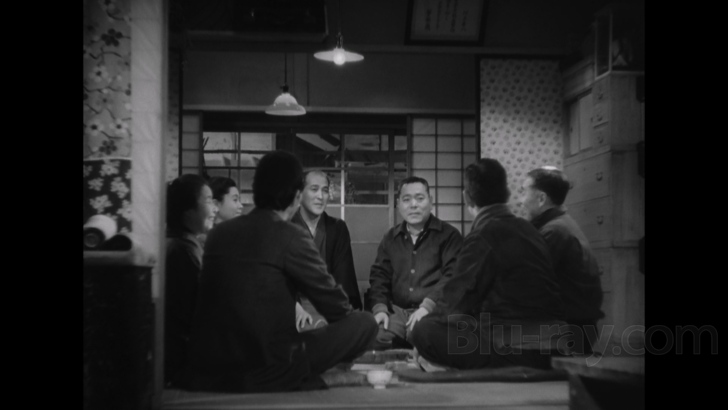
Tartan included a commentary track with the recently departed film critic Derek Malcolm. The BFI did not license it. Malcolm basically offers a general overview of Ozu's filmmaking style with not much in the way of historical tidbits on Record or Japan in the postwar years. There are several gaps in between his fairly brief remarks. The commentary gets a little better in the second half but overall, it's below average. Tartan also put a still gallery of eighteen snapshots from Record on the disc that look much clearer and cleaner than the transfer it did. Lastly, there's a bifurcated image restoration demo that diagonally shows an unrestored print on one half of the plane and a "restored" version on the other.
- NEW Audio Commentary by Japanese Cinema Expert Jasper Sharp - Sharp's feature-length track isn't up to to same level as Adrian Martin and Tony Rayns's commentaries are in this collection but it's certainly superior to Malcolm's. Sharp begins by discussing how and why the Shochiku logo was altered and also delves into the censorship restrictions that Ozu and his peers faced. He makes comparisons to Mikio Naruse's films to those of Ozu's. Sharp acknowledges when he makes a few digressions from the film but does return to his main discussion. This commentary isn't as well-organized as the other two but it's still pretty informative. In English, not subtitled.
Record of a Tenement Gentleman Blu-ray Movie, Overall Score and Recommendation 
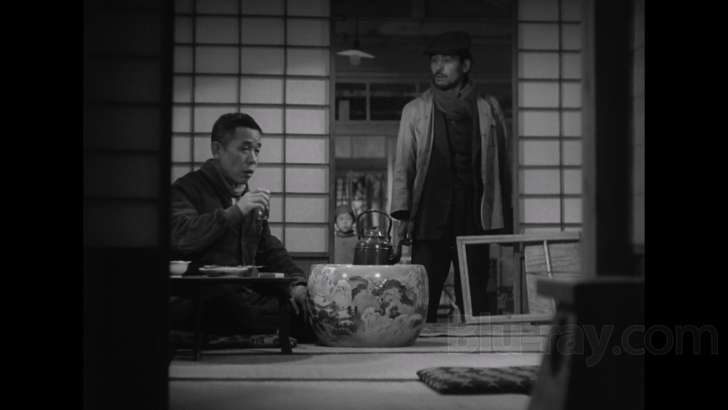
Record of a Tenement Gentleman presents a simple and straightforward story that's emotionally impactful as the relationship between Otane and Kohei deepens. The BFI's transfer, which is sourced from a 4K scan, is practically a miracle considering what shape the film was in during the mid-2000s. This goes to show how far digital restoration of older movies has come. Jasper Sharp's commentary is solid and worth a listen. DEFINITELY RECOMMENDED.
Similar titles
Similar titles you might also like
(Still not reliable for this title)

There Was a Father
1942

I Was Born, But...
1932

Equinox Flower
彼岸花 / Higanbana / The Ozu Collection
1958

The Only Son
一人息子 / Hitori musuko
1936

Late Autumn / A Mother Should Be Loved
秋日和 / Akibiyori | The Ozu Collection
1960

Early Summer / What Did the Lady Forget
麦秋 / Bakushū / The Ozu Collection
1951

The Flavour of Green Tea Over Rice
お茶漬けの味 / Ochazuke no aji
1952

An Autumn Afternoon
秋刀魚の味 / Sanma no aji | The Ozu Collection
1962

Floating Weeds
浮草 / Ukigusa / Masters of Cinema
1959

Tokyo Story
Remastered | 東京物語 / Tôkyô monogatari
1953

Good Morning
お早よう / Ohayō / The Ozu Collection
1959

Late Spring
晩春 / Banshun
1949

After the Storm
海よりもまだ深く/ Umi yori mo mada fukaku / Arrow Academy
2016

Sisters of the Gion
Gion no shimai
1936

Shoplifters
万引き家族 / Manbiki kazoku
2018

Nobody Knows
誰も知らない / Dare mo shiranai
2004

Like Father, Like Son
そして父になる / Soshite chichi ni naru
2013

Still Walking
歩いても 歩いても / Aruitemo aruitemo
2008

Profound Desires of the Gods
神々の深き欲望 / Kamigami no Fukaki Yokubo / Masters of Cinema
1968

Norte, the End of History
Norte, hangganan ng kasaysayan
2013